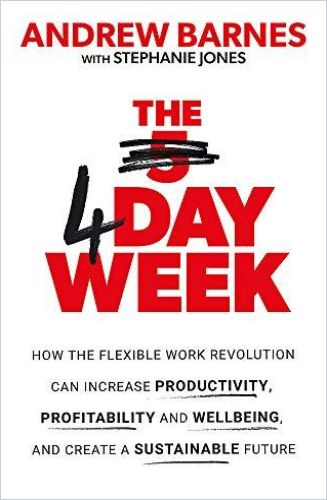New Zealand entrepreneur Andrew Barnes argues passionately for greater employee flexibility to save society, economies and the planet.

Work Less, Earn the Same
New Zealand entrepreneur Andrew Barnes has a mission, and he performs that mission using his own resources. Barnes fervently believes in maximum productivity and in worker well-being. This is a rare set of beliefs for the leader of a trust company.
Barnes’ actions are even more rare, though he would like to see them become standard practice worldwide. He writes, “A groundswell is building in favor of the traditional rights of workers.”
Overlong Work Weeks
This is Barnes’ manifesto, in which he details the functional and philosophical methods by which four-day workweeks can become a quotidian reality. Barnes deplores how 50- to 70-hour workweeks spread from the IT and investment banking worlds into the mainstream. He laments that in British and Canadian offices, the average employee logs only 1.5 to 2.5 hours of productive time in an average eight-hour workday. Barnes claims, and at times his claims seem valid, that a four-day workweek re-engages alienated employees.
At his trust company, Perpetual Guardian – which employed 240 people – Barnes implemented a four-day workweek. His employees suffered no cuts in salary or benefits. Barnes expected them to become more productive and efficient, and he celebrates that his rigorous metrics certified that they did.
Falling Wages
Barnes worries that home ownership often requires two full-time incomes. He notes that workers put off starting families for economic reasons. Barnes presents a menu of contemporary problems: Developed nations face historically low birth rates. Work stress generates less leisure time, less time with family and friends, more anxiety, greater unhappiness and worse health. Distracted, disengaged and unproductive employees show up, but do little. It’s clear from his writing that Barnes seldom suffers disengagement from anything.
Barnes rails against the situation faced by gig workers who toil long, irregular hours at two or three jobs with no benefits. “Whole economies will become imperiled,” he writes, “by a generation of gig workers with nothing to fall back on.” Worldwide, he insists, governments must reduce gig work. Consumers, Barnes states forcefully, should do business with firms that treat employees, communities and the environment responsibly and stop rewarding suppliers whose cheap, convenient wares damage society. Barnes’s enthusiastic support for workers makes his proselytizing all the more convincing. And unusual.
There is an urgent need to change – in quite an extreme way – how we work, if we are to get the best out of people and commerce, and begin to relieve the strain on ourselves and our planet.Andrew Barnes
Barnes argues, perhaps with some over-reach, that adopting a four-day workweek boosts employee engagement and health and can help heal the environment and arrest several negative social trends, such as environmental damage, declining birth rates in the developed world and estrangement within families due to work pressures.
Make Employers Accountable
Barnes contends – and has the metrics to back up his contention – that a four-day workweek with full pay for full performance gives employees flexibility and holds employers accountable for their proportionate share of taxes and benefits. Perpetual Guardian’s four-day workweek experiment ran for eight weeks. Barnes emphasizes that, in addition to applying objective metrics, his company solicited employee feedback about whether a 32-hour week can match 40-hour week in output, customer satisfaction and performance. The four-day workweek,” he emphasizes, “is about productivity first.“
Barnes cites improvements in engagement, teamwork, perceptions of psychological safety and openness to change. Productivity and performance held steady. Employees became more efficient. Most spent more time with their families. Barnes is loath to be taken as a do-gooder with no sense of the bottom line. What converted him was how a four-day week nourishes profits. He’s adamant that leaders must reinstate the five-day weeks if employees don’t meet their productivity goals.
The Four-Day Week
Barnes framed this approach as a gift his employees earned by doing five days work in four. He insists companies should never make participation mandatory. “The four-day week is an employee-led process,” he says, “where the magic bullet is trust.”
Barnes admirably dots his “i’s” and crosses his “t’s.” He delves into the legal aspect of the four-day workweek, noting that New Zealand employment laws permitted implementation if employees chose it willingly. He details how employees accrued vacation on a five-day schedule. Always advocating for workers, Barnes recommends bosses remind them that they retain rights and benefits. Let workers, Barnes stresses, organize this change for the greatest productivity.
Good for Employees – and the Planet
Any author arguing for a panacea risks being mistaken for an evangelist, not a strategist. Despite Barnes’ strong convictions, he avoids this trap. By consistently offering data-driven evidence that worker contentment fuels efficiency and profit, Barnes offers a powerfully convincing argument for a more humane approach to productive work.
With Barnes leading the way, Perpetual Guardian encouraged employees to perform volunteer work. He recommends that governments reward firms whose employees address climate change through reduced workweeks and work-from-home initiatives. With an extra day to spend with a child, people might start families or start them sooner. Barnes makes some rather large claims for the four-day workweek when he suggests that the flexibility might help dual-income households balance home and family, including the growing need to care for elderly parents. Gender pay differences, he believes, would resolve.
A Springsteen Fan
Barnes’ is a sound, straightforward writer and a Bruce Springsteen fan. Perhaps his affinity for Springsteen fuels his empathy for working people, his strong writing cadence, short readable sentences and clear ideas. His program makes enormous claims for one small change in the workweek, but Barnes’ heartfelt conviction that his method can make a new world possible might well convert you.









